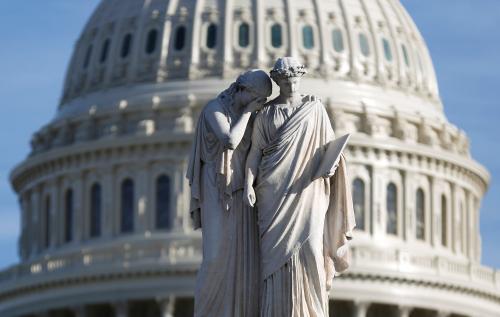Alice Rivlin delivered the following testimony before the Senate Committee on Homeland Security and Government Affairs’ Subcommittee on Federal Spending Oversight and Emergency Management on February 6, 2018.
Mr. Chairman, Ranking Member Peters, and members of the Subcommittee: I am grateful to the Subcommittee for holding this hearing to call attention to the total breakdown of federal budgetary policy-making. I believe this breakdown is a serious threat to our democracy and America’s future prosperity.
Budget Paralysis is Costly
It is both frightening and embarrassing that the world’s most experienced democracy is currently unable to carry out even the basic responsibility of funding the services that Americans are expecting from their government in the current fiscal year. Limping from one short-term continuing resolution to another, combining individual appropriations bills into unwieldy omnibus bills that no one is able to study or even read, and threatening to close the government (or default on the debt) if certain conditions are not met are all symptoms of a deeply broken decision-making process.
The costs of budgetary dysfunction are high and rising, although not easy to quantify. Federal agencies, including the Department of Defense, cannot make plans that enable them to spend money efficiently. Recipients of federal funding—states and localities, contractors, universities, non-profits and other service providers—cannot hire needed workers or plan their activities effectively. The morale of the workers we count on to serve the public is understandably eroding and confidence in Congress and the executive is at a low ebb.
It is both frightening and embarrassing that the world’s most experienced democracy is currently unable to carry out even the basic responsibility of funding the services that Americans are expecting from their government in the current fiscal year.
The most worrisome cost of the Congress’s seemingly-endless wrangling over near-term federal funding is that it crowds out serious discussions of the daunting longer-term challenges that face the nation’s economy. If policy-makers want to protect American prosperity in the long term and ensure that future gains are broadly shared, they must confront serious obstacles, including an aging population with rising health costs, lagging wages and productivity growth, extreme increases in inequality of income and wealth, climate change and costly natural disasters, and rapid projected increases in national debt. These are all manageable challenges—problems that proven policies could at least mitigate—but economic policy-makers in Congress and the executive are currently so obsessed with sniping at each other over short-term government funding that they are not engaging in the hard work of crafting solutions to these serious problems that loom ahead.
Partisan Warfare is the Problem
The principal obstacle to budget action and constructive economic policy-making is the extreme partisan warfare that has paralyzed Washington. Instead of working together to solve problems, each party is blaming and demonizing the other in hopes of winning the next election, while respectful deliberation over alternative policies has ground to a halt.
All group decision-making takes negotiation and compromise, especially in a big, diverse country like the United States, with a wide spectrum of views about what the federal government should do and how to pay for it. The framers of the Constitution understood that national policy making would be extremely difficult in such a diverse country and bequeathed us a framework for federal decision-making that requires negotiation and compromise at every stage of legislation—within the House and the Senate, between the two chambers, between the congress and the president, and sometimes with the courts.
But the art of political compromise and consensus building, once deemed an essential element of governance, has fallen into disrepute. Concepts like “compromise,” “consensus,” and “bipartisanship” are seen as evidence of a weak will or even worse—weak principles. Partisan leaders are acting as though the United States had a parliamentary system in which a cohesive majority party can simply write all the rules until rejected by the voters. This style of governance is incompatible with our constitutional system. In fact, when one party chooses to impose its will on the other in an attempt to avoid compromise, it all but guarantees gridlock, destructive swings in policy, or both.
I believe Congress and the executive cannot function effectively to make national policy until they begin working together again across partisan, ideological and geographic divides and restore political compromise to a place of honor in the list of skills needed for retaining public trust.
Moreover, I perceive that finding common ground may not be as difficult in tax and spending matters as in some other arenas. Although partisan rhetoric would lead you to believe there are stark differences in the economic philosophies of the two parties (Republicans for minimal government, free markets, and personal responsibility; Democrats for active government, regulated markets, and public responsibility), in practice the differences are not so sharp. Crafting pragmatic solutions that command broad public support involves negotiating modest changes along a continuum, balancing competing interests, and not scaring a public that is generally afraid of radical change. Forging consensus policy takes patience and hard work. As long as the parties prefer blaming each other for dysfunctional outcomes to working together on constructive solutions, though, consensus policies will continue to elude us and Americans will suffer as a result.
I believe the first step in restoring a functional budget process is to find a way to deescalate warfare between the parties. Currently, small groups of moderates in both parties are working hard to craft solutions to tough problems, including immigration policy, that can command broad consensus in Congress and the public. They deserve gratitude and support. Bipartisan negotiation and consensus-building must become a normal part of congressional decision-making again—not a desperate response to an artificial dead-line—if the American democratic process is to regain the confidence of voters and the respect of countries that look to us for leadership.
Budget Process Reform Could Help
Structural changes to the budget process can also help. The current budget process is totally broken—as evidenced by the chaotic reliance on CRs and omnibus bills that occasioned this hearing. However, a nostalgic return to “regular order” is not the answer if it means trying to restore the complex, multi-layered budget process that evolved under the 1974 Budget Act. That process was always cumbersome and over-focused on discretionary spending at the expense of mandatory spending and spending through the tax code, which have come to dominate the modern federal budget. Reform of the budget process must reflect these current budget realities.
There are many of proposals for budget process reform and many experts and organizations eager to offer advice. The late Senator Pete Domenici and I, under the auspices of the Bipartisan Policy Center, made a proposal in July 2015 that I believe encapsulates the main elements of a more workable budget process.1 The proposal had three major themes:
“1) The budget process should include all federal spending and revenues. It should not leave entitlement spending or tax expenditures on automatic pilot, as they are now, but should allow Congress and the president to agree on all spending and revenues and review their decisions on a regular schedule.
2) The process should be transparent and completed on time. The current complexity should be reduced and incentives put in place to finish the budget before the start of the fiscal year.
3) The budget should have buy-in from the president and the leadership of both houses of Congress. The budget process is the forum in which differences between the branches on fiscal priorities must be addressed, debated, and resolved. It requires the active participation of executive and legislative leadership.”
We offered ten specific recommendations designed to reinforce these themes, which are detailed in the attached report.
Budget process reform could help Congress deal more easily with budget decisions and, indeed, is long overdue. I also believe that Congress would benefit greatly from simplifying the committee and subcommittee structure to reduce overlapping jurisdictions. Simplifying the budget itself and drastically reducing the number of budget accounts would also facilitate more timely decision-making. But no process or structural change will help Congress and the executive branch make decisions on the budget or resolve other major issues facing the country unless elected officials recognize that the public desperately wants you to get out of partisan attack mode and start working together to find common ground.
Thank you for this opportunity to share these thoughts.





Commentary
TestimonyThe high cost of budgetary paralysis
February 6, 2018